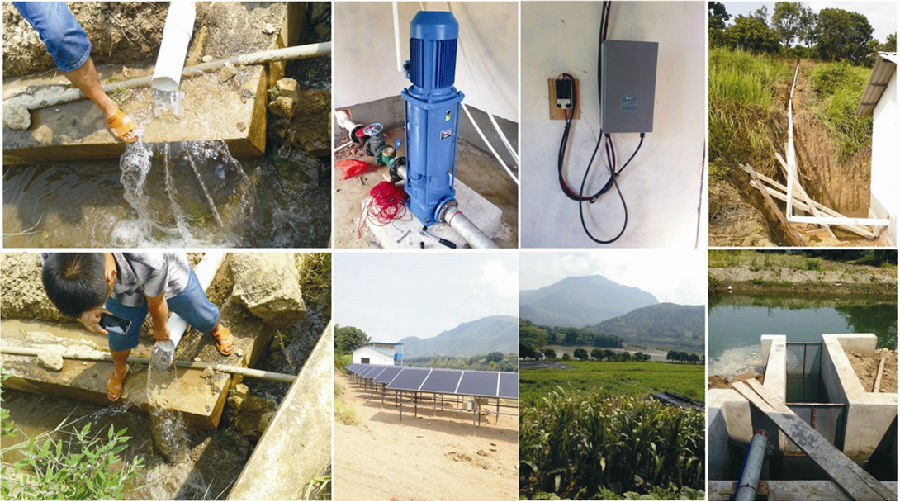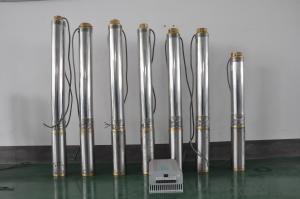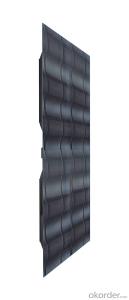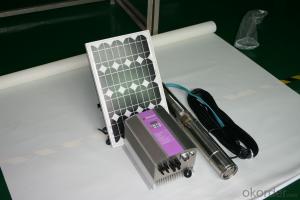Solar Water Pump L3D-10-180
- Loading Port:
- China Main Port
- Payment Terms:
- TT OR LC
- Min Order Qty:
- -
- Supply Capability:
- 300 sets /month
OKorder Service Pledge
OKorder Financial Service
You Might Also Like
Product description:
Product: Solar water pump
Model:L3D-10-180

Appilication:
surface pump
for surface water of pond, river, lake
for irrigation of a big farm with 6000 m2 on the top of a small mountain
Product specification:
flow rate:10m3/ hour, 80m3/day.
lift: 10m-180m
pump diameter: 296mm
Pump installed on the ground, outlet to the water surface:4m
with AC motor, motor power:5.5kW
but only need solar power:3.2kW(while Grundfos pump needs at least 11.5kW solar power, our pump can save more than 50% solar panel power,save USD3600 cost for solar panel per set.
Material:
Pump inside: stainless steel and wearable nylon,it enables our solar pump to have 10 years sevice life.
Motor : AC motor, 380V , three phase , 50Hz. The pump also can connect with grid power directly.
Certification:
3 International patent
ISO9001
CE
Warranty:2 years
- Q:Can a solar pump be used for fire-fighting purposes?
- Yes, a solar pump can be used for fire-fighting purposes. Solar-powered water pumps are commonly used in areas where there is no access to electricity or during emergencies. These pumps utilize energy from the sun to power the motor, which in turn drives the pump to move water. In fire-fighting scenarios, solar pumps can be used to draw water from a nearby source such as a well, pond, or river and supply it to firefighters for extinguishing fires. They are portable, easy to set up, and can provide a reliable source of water without the need for electricity or fuel. However, it is important to note that the performance of a solar pump may vary depending on factors such as sunlight availability and pump capacity, so it is crucial to ensure that the pump is properly sized and suited for the specific fire-fighting requirements.
- Q:Can a solar pump be used for both water supply and irrigation?
- Yes, a solar pump can be used for both water supply and irrigation. Solar pumps are designed to draw water from a source such as a well, river, or pond, and then pump it to the desired location. This can be used for various purposes, including supplying water for domestic use or livestock, as well as for irrigation purposes. Solar pumps are particularly useful for irrigation as they can provide a sustainable and cost-effective solution. They operate using solar energy, which is abundant and renewable, reducing reliance on electricity or fuel-powered pumps. This makes them especially suitable for remote or off-grid areas where access to electricity may be limited or unreliable. Additionally, solar pumps can be equipped with features such as timers and sensors, allowing for automated irrigation systems. This ensures that crops receive the right amount of water at the right time, promoting efficient water usage and maximizing crop yield. In conclusion, solar pumps are versatile and can be used for both water supply and irrigation purposes. They offer a sustainable and environmentally friendly solution, making them a popular choice for agricultural and water supply applications.
- Q:How long does it take to install a solar pump system?
- The installation time for a solar pump system can vary depending on factors such as the size of the system, complexity of the setup, and the expertise of the installation team. However, on average, it typically takes around 2-5 days to install a solar pump system.
- Q:Can a solar pump be used for fountain or decorative water features?
- Yes, a solar pump can definitely be used for fountains or decorative water features. Solar-powered pumps are specifically designed to operate using energy from the sun, making them a great option for outdoor water features. They are environmentally friendly, cost-effective, and easy to install since they don't require any electrical wiring. Additionally, solar pumps offer the flexibility of being able to operate even in areas without access to electricity.
- Q:How does the slope of the terrain affect the installation of a solar pump?
- The slope of the terrain can significantly impact the installation of a solar pump. A flat or gently sloping terrain is generally easier to work with as it requires less structural adjustments and leveling. On the other hand, a steep slope might require additional measures such as building a foundation or constructing a platform to ensure proper stability and alignment of the solar pump system. Moreover, the slope can also affect the positioning of solar panels to maximize their exposure to sunlight. Overall, the slope of the terrain must be carefully considered during the installation process to ensure the efficient and effective operation of the solar pump.
- Q:Can a solar pump be used for irrigation in sandy or arid areas?
- Yes, a solar pump can be used for irrigation in sandy or arid areas. Solar pumps are designed to operate using solar energy, which is abundant in such areas. They can effectively draw water from underground sources and distribute it for irrigation purposes, even in sandy or arid conditions. The use of solar pumps in these areas helps to reduce dependency on traditional energy sources and provides a sustainable solution for irrigation needs.
- Q:What is the lifespan of a solar pump?
- The lifespan of a solar pump typically ranges from 15 to 20 years, depending on factors such as the quality of the pump, maintenance, and usage conditions.
- Q:Can a solar pump be used for water supply in military bases or camps?
- Certainly, a solar pump can be utilized for water supply at military bases or camps. Solar pumps prove to be an exceptional choice for remote areas where access to electricity may be limited or undependable. They have the capability of offering a dependable and sustainable water source for various purposes such as drinking, cooking, bathing, and irrigation. Troops stationed at military bases and camps often require a steady and trustworthy water supply to fulfill their needs. By installing solar pumps, water can be drawn from wells, boreholes, or other sources, ensuring a continuous water supply. This is especially advantageous in areas where infrastructure may be scarce or non-existent, as it eliminates the necessity for expensive and intricate electrical systems or fuel-powered generators. Solar pumps are highly energy-efficient and operate by converting sunlight into electricity through the use of solar panels. Consequently, they are environmentally friendly and reduce reliance on fossil fuels. Moreover, solar pumps have minimal maintenance requirements, thereby reducing the need for frequent servicing or repairs. In military bases or camps, where security and self-sufficiency are of utmost importance, solar pumps present numerous advantages. They offer a reliable and independent water supply, diminishing the reliance on external resources. Furthermore, they can be effortlessly transported and deployed in different locations, making them suitable for temporary or mobile military operations. All in all, solar pumps present a pragmatic and effective solution for water supply in military bases or camps, providing sustainability, reliability, and cost-effectiveness.
- Q:Can solar pumps be used for fish ponds or aquaculture?
- Yes, solar pumps can be used for fish ponds or aquaculture. Solar-powered water pumps are an efficient and environmentally friendly option for pumping water in these applications. They can help maintain the desired water level, flow, and oxygenation required for fish ponds or aquaculture systems, without the need for electricity or fuel. Additionally, solar pumps can be cost-effective in the long run as they rely on renewable energy sources.
- Q:How does the cost of maintenance for a solar pump system compare to a traditional electric pump?
- The cost of maintenance for a solar pump system is generally lower compared to a traditional electric pump. Solar pumps have fewer moving parts, which reduces the risk of mechanical failures and the need for frequent repairs. Additionally, solar pumps do not require fuel or electricity, minimizing the expenses associated with energy consumption. However, it is important to note that occasional maintenance may still be required for the solar panels and batteries in a solar pump system.
1. Manufacturer Overview |
|
|---|---|
| Location | |
| Year Established | |
| Annual Output Value | |
| Main Markets | |
| Company Certifications | |
2. Manufacturer Certificates |
|
|---|---|
| a) Certification Name | |
| Range | |
| Reference | |
| Validity Period | |
3. Manufacturer Capability |
|
|---|---|
| a)Trade Capacity | |
| Nearest Port | |
| Export Percentage | |
| No.of Employees in Trade Department | |
| Language Spoken: | |
| b)Factory Information | |
| Factory Size: | |
| No. of Production Lines | |
| Contract Manufacturing | |
| Product Price Range | |
Send your message to us
Solar Water Pump L3D-10-180
- Loading Port:
- China Main Port
- Payment Terms:
- TT OR LC
- Min Order Qty:
- -
- Supply Capability:
- 300 sets /month
OKorder Service Pledge
OKorder Financial Service
Similar products
New products
Hot products
Hot Searches
Related keywords



























